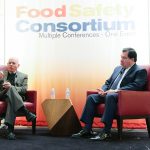Does your company need to worry about regulations relating to foods designed for infants (considered to be anyone aged 0-12 months)? If you manufacture infant formula, then of course the answer is yes. But what if you manufacture baby food—those cute little jars of liquified goodness? Traditionally, those types of food haven’t been subject to any special FDA regulations. Manufacturers simply need to follow the regulations that govern all foods designed for consumption by humans of any age. That, however, is changing.
There is a growing push to limit, and ultimately eliminate, heavy metals, such as inorganic arsenic, lead, cadmium, and mercury, present in baby food. These elements are present in our food chain in amounts that are concerning to members of the U.S. Congress and other stakeholders because of modern manufacturing techniques, and they have an outsized effect on infant health.
Pending Legislation
On March 25, 2021, the Baby Food Safety Act was introduced in Congress. As of the time this article was written, it had not yet passed. If it passes, it will require manufacturers, within one year of its enactment, to reduce levels of inorganic arsenic in non-cereal foods to 10 ppb and in cereals to 15 ppb, levels of cadmium and lead to 5 ppb in non-cereals and 10 ppb in cereals, and levels of mercury to 2 ppb in non-cereals and cereals. Within three years of enactment, the Act requires that final regulatory levels be set that reduce these levels to an even lower amount. It also requires reevaluation of the current regulatory levels every five years thereafter.
But the Act would do much more than simply setting limits for heavy metals in baby food. It would also:
- Add regulations to the Food Drug and Cosmetics Act requiring FDA to specifically regulate foods for consumers up to 36 months old
- Require manufacturers to report levels of heavy metals biannually on their websites
- Give FDA mandatory recall authority
- Mandate creation of public awareness campaigns
- Offer grants for farming research
Current FDA Actions
The FDA is already working to reduce heavy metals in baby foods. In August 2020, the FDA finalized guidance setting the limit for inorganic arsenic in baby rice cereals to 100 micrograms per kilogram. Fortunately, most manufacturers had already achieved those limits; sampling from 2018 showed that 76% of manufacturers were in compliance, up from 47% in 2014 and from just 36% between 2011 and 2013.
In early 2021, FDA launched an action plan to address heavy metals in foods consumed by infants and young children, called Closer to Zero. The overarching purpose of the plan is to gather data about heavy metal levels and then set tolerances for those substances, with the input from all stakeholders. Thus, the FDA has signaled its intent to act regardless of what Congress has in store.
More recently, the FDA issued draft guidance, titled “Action Levels for Lead in Food Intended for Babies and Young Children,” recommending that levels of lead be limited to 10 ppb in fruits, some vegetables, and yogurt, and to 20 ppb in root vegetables and dry cereal. The guidance is focused on processed foods, including foods served in jars, pouches, tubs, and boxes intended for children under two.
Whatever the ultimate outcome of these initial steps taken by Congress and FDA, one thing is clear: Concerns about heavy metals in the foods consumed by our tiniest citizens isn’t going away. So, if the product you manufacture or grow may be destined for a jar of baby food—even if you don’t think you manufacture baby food—it’s time to begin working to address the issue in your facilities and your fields.






